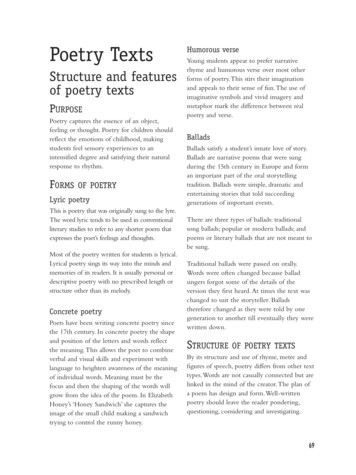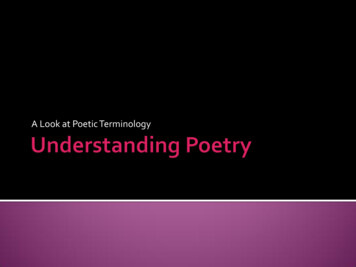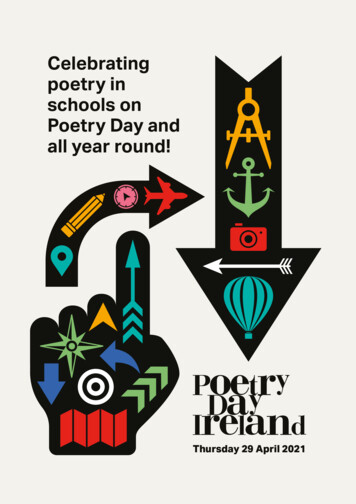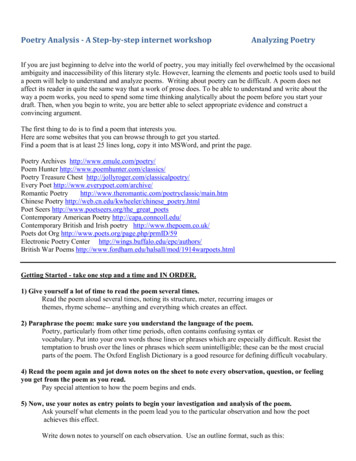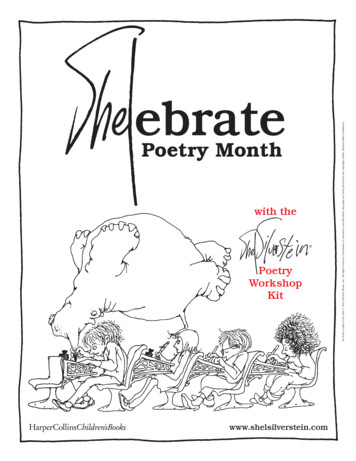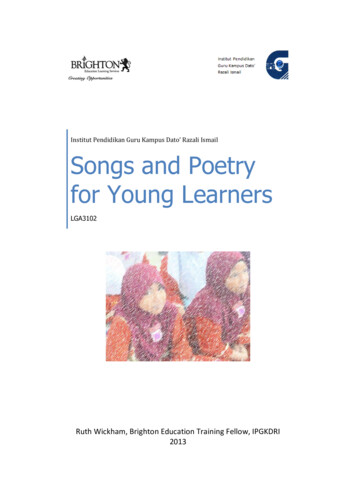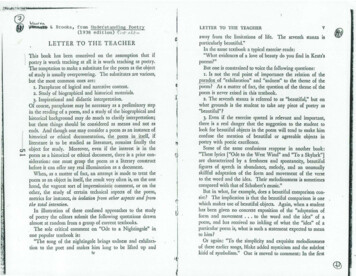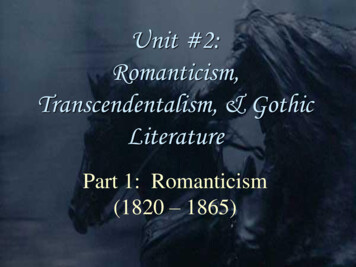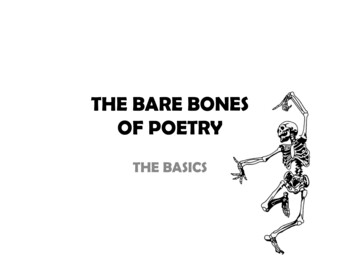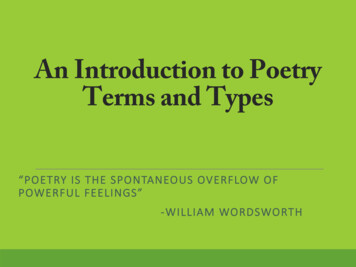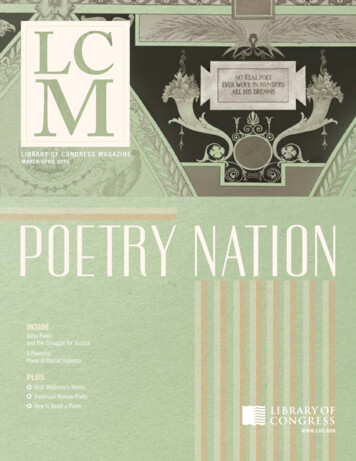
Transcription
LIBRARY OF CONGRESS MAGAZINEMARCH/APRIL 2015poetry nationINSIDERosa Parksand the Struggle for JusticeA PowerfulPoem of Racial ViolencePLUSWalt Whitman’s WordsAmerican Women PoetsHow to Read a PoemW W W.LOC.GOV
LIBRARY OF CONGRESS MAGAZINELibrary of Congress MagazineVol. 4 No. 2: March/April 2015Mission of the Library of CongressThe mission of the Library is to support theCongress in fulfilling its constitutional dutiesand to further the progress of knowledge andcreativity for the benefit of the American people.Library of Congress Magazine is issuedbimonthly by the Office of Communicationsof the Library of Congress and distributed freeof charge to publicly supported libraries andresearch institutions, donors, academic libraries,learned societies and allied organizations inthe United States. Research institutions andeducational organizations in other countries mayarrange to receive Library of Congress Magazineon an exchange basis by applying in writingto the Library’s Director for Acquisitions andBibliographic Access, 101 Independence Ave.S.E., Washington DC 20540-4100. LCM is alsoavailable on the web at www.loc.gov/lcm.All other correspondence should be addressedto the Office of Communications, Libraryof Congress, 101 Independence Ave. S.E.,Washington DC 20540-1610.In This IssueFEATURES810160203James H. BillingtonLibrarian of Congress06Audrey FischerEditorJohn H. SayersManaging EditorAshley JonesDesignerThe Power of a PoemBillie Holiday’s powerful ballad about racial violence, “Strange Fruit,”was written by a poet whose works are preserved at the Library.National PoetsFor nearly 80 years the Library has called on prominent poets to helppromote poetry.Beyond the BusThe Rosa Parks Collection at the Library sheds new light on theremarkable life of the renowned civil rights activist.6Walt WhitmanDEPARTMENTSe-mail pao@loc.govwww.loc.gov/lcmISSN 2169-0855 (print)ISSN 2169-0863 (online)Gayle OsterbergExecutive EditorMARCH/APRIL 20150405071520How Do I?22Online Offerings24Books That Shaped Us26Expert’s Corner28Trending23Curator’s Picks25First Drafts27Page from the PastThe Library in History16Rosa ParksFavorite PlacesAround the LibraryNews BriefsShop the LibrarySupport the LibraryLast Word23ON THE COVER: Excerpts from the poem “Unexpressed” by Adelaide Proctor (1825-1864)adorn panels along the second floor north and south corridors in the Library’s ThomasJefferson Building. Carol HighsmithPatricia SmithShawn MillerPhoto EditorThis mural by George R. Barse Jr. depicting Lyric Poetry (Lyrica)adorns the second floor east corridor in the Library’s Thomas JeffersonBuilding. Carol HighsmithContributing WritersMarwa AmerPeter ArmentiMatthew BlakleyRobert CasperCatalina GómezJeanne TheoharisStephen WessonCharles WrightCONNECT ONTwitter: @librarycongressYoutube: youtube.com/libraryofcongressFacebook: facebook.com/libraryofcongressFlickr: flickr.com/photo/library of congressPinterest: pinterest.com/libraryofcongressLibrary of Congress blogs: blogs.loc.govLCM online: loc.gov/lcmM arch /A pril 2015 loc .gov/lcm1
how#trendingDO I?READ A POEM OUT LOUDFORMER POET LAUREATE Billy Collinsoffers his advice to high-schoolstudents on reading poetry aloud.“A poem will live or die depending onhow it is read,” he says. What follows,then, are a few pointers about the oralrecitation of poetry. Get your poem afew days in advance so you will havetime to practice.Introduction to PoetryBilly CollinsI ask them to take a poemand hold it up to the lightlike a color slideHere are a few basic tips: or press an ear against its hive.I say drop a mouse into a poemand watch him probe his way out,I want them to waterskiacross the surface of a poemwaving at the author’s name on the shore.But all they want to dois tie the poem to a chair with ropeand torture a confession out of it. Poems come in lines, but pausing at the end of every line will createa choppy effect and interrupt the flow of the poem’s sense. You shouldpause only where there is punctuation, just as you would when readingprose, only more slowly.They begin beating it with a hoseto find out what it really means.From “The Apple that Astonished Paris,”1996. University of Arkansas Press,Fayetteville, Ark. Copyright 1988 byBilly Collins Use a dictionary to look up unfamiliar words and hard-to-pronouncewords. To read with conviction, you need to know at least the dictionarysense of every word. In some cases, you might want to write out a wordphonetically as a reminder of how it should sound.During his term as Poet Laureate (2001-2003), Billy Collins launchedthe Poetry 180 project, designed to give high-school students a poema day to read out loud during the school year. It remains one of themost popular features of the Library’s website. Collins’ “Introduction toPoetry” (left) is the first poem on the Poetry 180 site.MORE INFORMATIONPoetry 180 Websiteloc.gov/poetry/1802LCM Library of Congress MagazinePOPULAR POETRY PROGRAMS GIVE YOUNGPEOPLE A PLATFORM FOR EXPRESSION.singer-songwriter Tanuja Desai Hidier andMaryland State Sen. Jamie Raskin.National Poetry Month, celebrated each April,provides an opportunity to encourage newreaders and writers of verse. Poetry events andcompetitions can also interest young peoplein this genre.“This is a poetry slam; this is an interactive artform,” said poet and spoken-word performerElizabeth Acevedo, who emceed the event.“Someone gets up here, they are saying words.These might be words that they’ve never saidbefore. They want to know that you are hereand that you are listening. So you’ve got to clap.You’ve got to do whatever you need to do to letthem know that you are here.”The Library also hosted the top winners ofthe Poetry Out Loud national competitionat the 2014 National Book Festival, as it hasdone since the poetry program’s nationwideinception in 2006. Each participant performedfavorite poems and answered questions posedby the audience.Read the poem slowly. Most people read rapidly, and a nervousreader will tend to do so in order to get the reading over with. Reading apoem slowly is the best way to ensure that the poem will be read clearlyand understood by its listeners. A good way for a reader to set an easypace is to pause for a few seconds between the title and the poem’sfirst line.Read in a normal, relaxed tone of voice. It is not necessary to give anyof these poems a dramatic reading as if from a stage. Poems that arewritten in a natural style should be read that way. Just speak clearly andslowly and let the words of the poem do the work.or walk inside the poem’s roomand feel the walls for a light switch.THE VERSE OFYOUTHBilly Collins reads at theLibrary’s 2014 NationalBook Festival. KimberlyPowell AT THE LIBRARYYoung people perform in the Poetry Slamcompetition at the Library’s 2014 National BookFestival.Poetry Out Loud, a competition with highschool, regional and national rounds, requiresits contestants to memorize and recite poemspulled from a predetermined and aestheticallydiverse list. It is sponsored by the NationalEndowment for the Arts (NEA) and thePoetry Foundation.Poetry slams have risen in popularity amongyoung people wanting to give a voice to theirown narratives. Slam poetry is a subgenreof poetry that fuses the craft of publicperformance and the craft of poetry. Some slampoems are performed using a rhythmic, or HipHop style, while others may be performed withmore theatrical elements.“Poetry Out Loud encourages young peopleacross the country to learn about classic andcontemporary poetry through memorizationand recitation,” said Eleanor Billington ofthe NEA. “Poetry Out Loud not only helpsstudents learn a poem, but they’re also buildinglife skills. They’re learning analytical skills,they’re also building self-confidence and they’relearning about their literary heritage.”The Library of Congress hosted its firstever Poetry Slam at the 2014 National BookFestival. The event, titled “Stage [Heart]Page,” was sponsored jointly by the Library’sPoetry and Literature Center in the Center forthe Book, Split This Rock and the NationalEndowment for the Arts. The competition,which featured eight contestants from theDistrict of Columbia’s top youth slam groups,the DC Youth Slam Team and Louder Thana Bomb DMV, was judged by internationallyacclaimed slam poet Gayle Danley, author and—Matthew Blakley is the program supportassistant in the Library’s Poetry andLiterature Center.MORE INFORMATIONView the Library’s Poetry Slamgo.usa.gov/tx8mView the Library’s Poetry Out Loud Eventgo.usa.gov/3c4J4RIVER OF WORDSRiver of Words, aninternational poetryand art contest, wasco-founded in 1995 bywriter Pamela Michaeland poet Robert Hass,during his tenureas Poet LaureateConsultant in Poetry(1995-1997) to helpyoung people expresstheir feelings aboutthe environment.Administered bythe Center forEnvironmental Literacyat Saint Mary’sCollege of Californiain affiliation with theLibrary’s Center forthe Book, the programis the world’s largestcompetition of its kind.Prizes are awardedto K-12 studentsfor their poems andartwork about theenvironment. Picturedabove is “RiverDream” by Anna Qianof Lilburn, Ga., age 13.Learn more about River of Wordsread.gov/letters/M arch /A pril 2015 loc .gov/lcm3
onlinecurator’sOFFERINGSLITERARYARCHIVESPOETRY AND LITERARY RECORDINGS SPANNINGSEVEN DECADES WILL SOON BE FREELYAVAILABLE ONLINE.In the spirit of preserving and promoting poetry,literature and the spoken word, the Library’sHispanic Division and Poetry and LiteratureCenter have begun a collaborative effort to bringtwo paramount literary audio archives to anonline audience worldwide.Compiled in the Library, with curatorial acumenspanning more than 70 years, the Archive ofHispanic Literature on Tape and the Archiveof Recorded Poetry and Literature will comprisethis online feature. These two collections ofrecorded interviews and readings of their ownworks by prominent poets and authors will soonbe freely available to anyone, anywhere with aninternet connection.Housed in the Library’s Packard Campus forAudio-Visual Conservation in Culpeper, Va.,many of these readings were previouslyrecorded on magnetic tape reels, making itnecessary for them to be digitized by theLibrary’s Motion Picture, Broadcasting andRecorded Sound Division.Available as streamed audio, the online archivewill be launched in two parts. The Archive ofRecorded Poetry and Literature will be launchedwith 50 recordings in April 2015, duringNational Poetry Month. The Archive of HispanicLiterature will also launch with 50 recordings,during Hispanic Heritage Month, Sept. 15Oct. 15. Additional material will be added on amonthly basis, from these collections and otherliterary events.This collaboration between the HispanicDivision and the Poetry and Literature Centerbrings to full circle the wishes of Archer MiltonHuntington, the benefactor who, in the late1930s, endowed both offices within the Libraryof Congress for the promotion of art, literatureand Luso-Hispanic culture.AUDIO ARCHIVESThe Archiveof HispanicLiterature onTape and theArchive ofRecorded Poetryand Literaturewere both begunin 1943—byNobel prize-winningpoet Pablo Nerudathen-assistantrecords a reading ofchief of thehis work in the Library’sHispanic Divisionrecording studio.Prints and Photographs FranciscoAguileraDivisionand formerConsultant in Poetry Allen Tate,respectively.The Archive of Hispanic Literaturecollection contains nearly 700recordings of poets, novelists andessayists from the Luso-Hispanicworld, including Nobel Prize winnersGabriel García Márquez, GabrielaMistral, Pablo Neruda, Octavio Paz andJuan Ramón Jiménez.The Archive of Recorded Poetry andLiterature contains nearly 2,000recorded readings of poetry and prose.Highlights include Consultants in PoetryElizabeth Bishop, Gwendolyn Brooksand Robert Frost; Nobel LaureatesMario Vargas Llosa and CzeslawMilosz and writers Ray Bradbury, JohnCheever and Kurt Vonnegut.The project is the seed for what promises to be agrowing repository from around the library andaround the U.S. and the world—a central go-toplace for the literary audio experience.—Catalina Gómez is a program coordinatorin the Hispanic Division.MORE INFORMATIONArchive of Recorded Poetry and poetryand-literaturePICKSAMERICAN WOMEN POETSAMERICAN HISTORY SPECIALIST ROSEMARY FRY PLAKAS HIGHLIGHTSSEVERAL WOMEN POETS WHOSE WORKS ARE REPRESENTED IN THELIBRARY’S RARE BOOK AND SPECIAL COLLECTIONS DIVISION.1. Anne Dudley Bradstreet3. Mercy Otis WarrenBritish-born AnneBradstreet (1613-1672)was the first woman poetto be published in colonialAmerica. Her poemswere first published inLondon in 1650, followedby an expanded editionpublished posthumouslyin Boston in 1678.“Both in her breadth ofsubjects—home, family,nature, history, philosophyand religion—and in hersensitivity to prejudicesagainst women’s writings,Bradstreet is a worthypathfinder for the womenwho have followed her.”Poet and dramatist MercyOtis Warren (1728-1814)drew on her literary talents,democratic convictionsand friendships withpatriot leaders to produceher three-volumecommentary on theAmerican Revolution.“This singed title pageof Thomas Jefferson’spersonal copy shows howclose it came to the flamesof the Christmas Eve 1851fire that destroyed nearlytwo thirds of the booksJefferson had sold toCongress in 1815.”“The Tenth Muse latelySprung up in America,”London, 1650123“History of the Rise,Progress and Terminationof the AmericanRevolution,” Boston, 180542. Gwendolyn BrooksIn 1950, GwendolynBrooks (1917-2000)became the first AfricanAmerican to receivethe Pulitzer Prize forPoetry. “In her prizewinning work ‘AnnieAllen,’ Brooks providesa poignant portrait of ayoung black girl in Chicagoas a daughter, wife andmother.” After manyproductive years of writingand teaching, Brooksbecame the first AfricanAmerican woman to serveas the Library’s Consultantin Poetry, 1985-1986.“Annie Allen,” New York,19494. Emily Dickinson55. Phillis WheatleyAfrican-born poet Phillis Wheatley (1753-1784) was a slaveeducated by her Boston owner’s wife, who encouraged her topublish her poems. This collected work was published by theCountess of Huntingdon in London, where Wheatley had beenwelcomed by Benjamin Franklin and abolitionists Grenville Sharpeand the Earl of Dartmouth. “Her portrait was probably drawn by theAfrican American artist Scipio Moorhead, whose creative talents arepraised in one of Wheatley’s poems.”“Poems on Various Subjects: Religious and Moral,” London, 1773Emily Dickinson’s (18301886) beloved poem“Success”— one of thefew published during herlifetime—was submittedwithout her permissionby childhood friend andfellow poet Helen HuntJackson (1830-1885).“Jackson urged Dickinsonrelentlessly to publish herpoems and wished to beher literary executor, butalas, Jackson died the yearbefore Dickinson.”[George Parsons Lathrop]editor, “A Masque ofPoets,” No Name Series[v. 13] Boston, 1878All images Rare Book and Special Collections Division4LCM Library of Congress MagazineM arch /A pril 2015 loc .gov/lcm5
booksA WHITMAN SAMPLERTHE LIBRARY’S LIST OF “BOOKS THAT SHAPED AMERICA”SPARKED A NATIONAL CONVERSATION ON BOOKS AND THEIRIMPORTANCE IN OUR LIVES.The Library’s list of“Books That ShapedAmerica” includes WaltWhitman’s “Leaves ofGrass,” a compilationthat began with the 1855publication of a slim, 95page volume of 12 poems.The book underwentmany revisions during thepoet’s lifetime. Whitman,who continuouslyaltered the contents,regarded each versionOver almost 40 years, Walt Whitmanof “Leaves of Grass” asproduced these multiple editions ofits own distinct book.“Leaves of Grass.” Rare Book andSpecial Collections Division.He added new poems,named or renamed oldones, and, until 1881, repeatedly regrouped them. He developedthe typography, appended annexes, reworded lines, and changedpunctuation, making each edition unique. The collectionculminated with the “deathbed” edition in 1892, comprisingmore than 400 poems.Among the collection’s best-known poems are “I Sing the BodyElectric,” “Song of Myself,” and “O Captain! My Captain!” Theelegy to the slain President Abraham Lincoln was added to thefourth edition, published in 1867. (See page 7.)The title was a pun. “Leaves” referred to the pages on which itwas printed and “grass” was a derogative term for literary works oflittle value.Taken as a whole, the poems reflect Whitman’s philosophy of lifeand humanity, with an emphasis on nature and the physical body.His exaltation of the human form was considered immoral, in itsday, and some labeled it “obscene literature.” Also controversialwas the fact that few of the verses rhymed. The controversies onlyserved to increase sales: the first printing sold out in one day.Portrait of Walt Whitman, 1870 Feinberg-Whitman Collection,Prints and Photographs DivisionMORE INFORMATIONView the exhibition “Books That Shaped ca6firstTHAT SHAPED USLCM Library of Congress MagazineDRAFTSO CAPTAIN! MY CAPTAIN!When President Abraham Lincoln wasassassinated on April 14, 1865, a war-wearynation was plunged into shock. The murder ofthe president seemed to be a bloody, pointlessend to the protracted Civil War. There was agreat outpouring of grief across the country,and poems and songs were written mourningthe nation’s loss.One American who grieved for the fallenpresident was the poet Walt Whitman, who hadlived in Washington for most of the war and wasa great admirer of Lincoln. He often saw thepresident riding around town on horseback, andthe two men sometimes exchanged cordial bows.Lincoln’s death inspired Whitman to writeone of his most memorable works—a simple,three-stanza poem of sorrow that bore littleresemblance to his other, more experimentalwritings. “O Captain! My Captain!” was publishedin New York’s Saturday Press in November of1865, and was met with immediate acclaim.The poem, which spoke to readers throughoutthe shattered nation, was widely reprinted andanthologized during Whitman’s lifetime.“O Captain! My Captain!” became one of themost popular poems Whitman would ever write,and helped secure for him a position as one ofthe greatest American poets of the 19th century.He often recited the poem at his popular lectureson Lincoln.Whitman revised the poem several times afterits initial publication. When he noticed severalerrors in this printing (pictured at left), he mailedthe page to the publishers with his correctionsmarked in ink.— Stephen Wesson is an educational resourcespecialist in the Educational Outreach Divisionof the Office of Strategic Initiatives.Letter and corrected reprint of Walt Whitman’s“O Captain!, My Captain!” with comments by author,Feb. 9, 1888. Walt Whitman Collection, ManuscriptDivisionMORE INFORMATIONView the exhibition “Revising Himself: Walt Whitmanand Leaves of Grass”loc.gov/exhibits/whitmanM arch /A pril 2015 loc.gov/lcm7
“Strange Fruit”Southern trees bear a strange fruitBlood on the leaves and blood at the rootBlack bodies swingin’ in the Southern breezeStrange fruit hangin’ from the poplar treesPastoral scene of the gallant SouthThe bulgin’ eyes and the twisted mouthScent of magnolias sweet and freshThen the sudden smell of burnin’ fleshHere is a fruit for the crows to pluckFor the rain to gather, for the wind to suckFor the sun to rot, for the tree to dropHere is a strange and bitter cropBorn in the Bronx, Meeropol attended DeWitt Clinton High School, wherehe later taught English. The school’s other notable creative alumni includeJames Baldwin, Countee Cullen, Richard Rodgers, Burt Lancaster, Stan Lee,Neil Simon and Ralph Lauren.Meeropol published most of his work under the pseudonym “Lewis Allan,”in memory of the names of his two stillborn children. In 1937, his poemoriginally titled “Bitter Fruit” was published under his given name in theTeachers’ Union publication “The New York Teacher” and under his penname, in the Marxist publication “The New Masses.”Meeropol later set it to music and gave it to the owner of Café Society, anintegrated cabaret club in New York’s Greenwich Village. The club ownershared it with Billie Holiday, one of the club’s regular performers, whosang it at the end of a set in 1938—to a stunned audience. She recorded itthe following year under the title “Strange Fruit.” In 1999, Time magazinenamed “Strange Fruit” the song of the century. In 2002, it was selected forpreservation in the inaugural National Recording Registry.BY AUDREY FISCHERBILLIE HOLIDAY’S ICONIC SONG ABOUT RACIAL INEQUALITY WAS PENNED BYA POET WHOSE WORKS ARE PRESERVED IN THE LIBRARY OF CONGRESS.Recorded in 1939, Billie Holiday’s “Strange Fruit” brought the topic oflynching to the commercial record-buying public.Few may be aware that the song was based on a poem written severalyears earlier by Abel Meeropol (1903-1986), a Jewish high-schoolteacher from the Bronx, who was deeply affected by a 1930 photographof a lynching.8LCM Library of Congress MagazineAbel with wife AnneMeeropol, the firstperson to sing “StrangeFruit” in public, circa1935 Courtesy ofMichael and RobertMeeropolThis portrait of BillieHolliday performing ina New York nightclubappeared in Down Beatmagazine in 1947.William P. Gottlieb,Gottlieb Collection,Music DivisionLike many who railed against social injustice during the 1930s, Meeropolwas a member of the Communist party. At a Christmas party at the home ofcivil rights activist W.E.B. Du Bois, Meeropol and his wife were introducedto the young children of Ethel and Julius Rosenberg, a couple convicted ofconspiracy to commit espionage. The children were orphaned when theirparents were executed in 1953 at the height of the McCarthy Era. A fewweeks later, the children were sent to live with the Meeropols and took theirlast name.Meeropol, who taught until 1945, continued to write songs for such artistsas Peggy Lee and Frank Sinatra. One of his more well-known works, “TheHouse I Live In,” was sung by Sinatra in a 10-minute short film written byAlbert Maltz. The 1945 film, which was made to oppose anti-Semitism andracial prejudice at the end of World War II, received an honorary AcademyAward and a special Golden Globe award in 1946. In 2007, it was added tothe list of films selected for preservation in the National Film Registry.M arch /A pril 2015 loc .gov/lcm9
national poetsTHE NATION’S MOST ACCLAIMED POETS HAVE HELPED THE LIBRARY OF CONGRESS PROMOTE POETRY FOR NEARLY 80 YEARS.BY PETER ARMENTIThe highest poetry office in the country belongs—both literally andsymbolically—to the U.S. Poet Laureate. Headquartered at the Library’sPoetry and Literature Center in the attic of the Thomas Jefferson Building,the Poet Laureateship is the only national position dedicated to raisingawareness and appreciation of poetry among the American public.Originally established in 1936 as an endowed Chair of Poetry in theEnglish Language, the position, as conceived by Librarian of CongressHerbert Putnam, was created to build the Library’s literary collections andencourage their public use. The Library’s Consultant in Poetry, in otherwords, was expected to perform duties today carried out by full-fledgedlibrarians. This is reflected in a memo to poet Allen Tate (1943-1944)outlining his duties, which were limited not to only poetry but to “allEnglish and American literature.” Tate was appointed by Librarian ofCongress Archibald MacLeish, himself a Pulitzer Prize-winning poet.During the next 50 years, less emphasis was placed on requiring theConsultant in Poetry to develop the Library’s collections and more onorganizing local poetry readings, lectures, conferences and outreachprograms. A defining moment came in 1985, when Sen. Spark M.Matsunaga’s two-decade campaign to create a national Poet Laureateposition resulted in an act of Congress (Public Law 99-194), which changedthe consultant’s title to “Poet Laureate Consultant in Poetry” and chargedthe Librarian of Congress with making the selection. (See page 15.)Opposite, from left: Poet Archibald MacLeish served as Librarian of Congressfrom 1939 to 1944. George Fayer, Prints and Photographs DivisionPrints and Photographs DivisionFROM CONSULTANT TO LAUREATEWritten by Joseph Auslander upon beingappointed the first Consultant in Poetry(1937-1941):The simple phrase of gratitudeIs something rather felt than heard:Your quiet graces ruseThe overstrident thought or word.Wherefore this letter I inditereturns in but a meagre measureThe courtesy that gave delight,The fellowship that furnished pleasure.Herbert Putnam served as Librarian of Congress from 1899-1939 FrancesBenjamin Johnston, Prints and Photographs DivisionBackground image: The Poetry and Literature center Abby Brack Lewis10LCM Library of Congress MagazineM arch /A pril 2015 loc .gov/lcm11
FAVORITE POEM PROJECTRobert Pinsky,who served anunprecedentedthree terms (19972000), issued anational call forpeople to sendhim their favoritepoems, along withtheir justifications. Pinsky received morethan 18,000 submissions to his FavoritePoem Project. Selected submissions weresubsequently gathered into three poetryanthologies.The centerpiece of the project was thedevelopment of 50 video documentariesfeaturing people reading and discussingtheir favorite poems. The videos, whichaired as segments on PBS’s “TheNewsHour with Jim Lehrer,” can be viewedon the Favorite Poem Project websiteand are a permanent part of the Library’sArchive of Recorded Poetry and Literature.The project endures today, with six recentvideos featuring the favorite poems ofChicagoans and plans for more videos inthe future.AMERICANLIFE IN POETRYPROJECTTed Kooser (20042006) initiatedthe AmericanLife in PoetryProject to introduce poetry to a broadrange of readers through his free weeklypoetry column in newspapers and onlinepublications. Each column consists ofshort poems that an average reader canunderstand and appreciate, along with afew introductory words from Kooser. Theproject, which continues after a decadeand more than 500 columns, has beenimmensely successful in reaching millionsof readers each week.12LCM Library of Congress MagazineIn 1986, Robert Penn Warren became the first poetappointed under the new title, having been the Library’s thirdConsultant in Poetry more than 40 years earlier. HowardNemerov (1963-1964; 1988-1990) and Stanley Kunitz(1974-1976; 2000-2001) also have the distinction of servingtwice, each having been appointed Poetry Consultant andPoet Laureate.“The Poet Laureatepost is an honor, nota job,” said Pinsky.By including “Poet Laureate” in the title, the position becamethe American equivalent of the well-known and longstandingposition of British Poet Laureate. As a result, the visibility ofthe office, along with expectations for it, ballooned. Librarianof Congress James H. Billington described the Poet Laureateas “the nation’s official lightning rod for the poetic impulse ofAmericans.” Dr. Billington has appointed all but two of the20 Poets Laureate. (See page 15). In June 2014, he appointedCharles Wright the 20th Poet Laureate Consultant in Poetry.(See page 28.)PROMOTING POETS AND POETRYFostering the work of promising poets has long beenan interest, if not a responsibility, of the Poet LaureateConsultant in Poetry. Each year the Poet Laureate selectstwo or more poets to receive the Witter Bynner fellowship.The fellows are recognized at a reading in the nation’s capitaland go on to organize local poetry readings in their owncommunities.Administered by the Library of Congress, the fellowshipis sponsored by the Witter Bynner Foundation for Poetry.Harold Witter Bynner (1881-1968) was a prolific poet andphilanthropist who made provisions for a poetry foundationafter his death. The Witter Bynner Foundation for Poetry wasincorporated in 1972 in New Mexico to provide grant supportfor the writing of poetry through nonprofit organizations.Since its inception in 1998, 37 poets have received the WitterBynner fellowship, including the recently selected 2015winners. (See page 25.)From left, poets AllenTate, Léonie Adams,T.S. Eliot, TheodoreSpencer and RobertPenn Warren attend theannual meeting of theFellows of the Library ofCongress in AmericanLetters, November1948. Prints andPhotographs DivisionSeven Poets Laureate/Consultants in Poetryreturned to the Libraryfor a reading in theCoolidge Auditorium tocelebrate publicationof “The Poets LaureateAnthology.” From left:Librarian of CongressJames Billington;Carolyn Brown, formerdirector of the Officeof Scholarly Programs;and poets Mark Strand,Charles Simic, KayRyan, Maxine Kumin,Daniel Hoffman, RitaDove and Billy Collins,2010. Abby Brack LewisPoetry and LiteratureCenter head RobertCasper applauds 2014Witter Bynner winnersHonorée FanonneJeffers (center) andJake Adam York, whosewife Sarah Skeen (right)accepts his posthumousaward. AmandaReynoldsM arch /A pril 2015 loc .gov/lcm13
expert’sCORNERTHE LIBRARIAN OF CONGRESS DISCUSSES THESELECTION OF THE NATION’S POET LAUREATECONSULTANT IN POETRY.POETRY PROJECTSPer the legislation establishing the office, the Poet Laureate is appointedsolely on the basis of a poet’s lifetime literary achievement and has fewofficial responsibilities. However, many Poets Laureate have used theprestige and resources conferred through the position to launch initiatives,and sometime large-scale projects, that seek to introduce—or reintroduce—people to the value of poetry in their everyday lives. Pictured above, fromleft, the following poets implemented projects with a broad appeal duringtheir tenure:Joseph Brodsky (1991-1992) developed the idea of providing poetry inpublic places—supermarkets, hotels, airports, hospitals—where peoplecongregate and “can kill time as time kills them.”Matt ValentineRita Dove (1993-1995) brought together writers to explore the Africandiaspora through the eyes of its artists, and also championed children’spoetry and jazz through multiple events.WHERE POETRY LIVESNatasha Trethewey (2012-2014)participated in “Where PoetryLives,” a series of reports with PBS“NewsH
6 Books That Shaped Us 0. 7 First Drafts 15. Expert's Corner 20. Page from the Past 22. The Library in History 23. Favorite Places 24. Around the Library 25. News Briefs 26. Shop the Library 27. Support the Library 28. Last Word. CONNECT ON. LIBRARY OF CONGRESS MAGAZINE. This mural by George R. Barse Jr. depicting Lyric Poetry (Lyrica)
